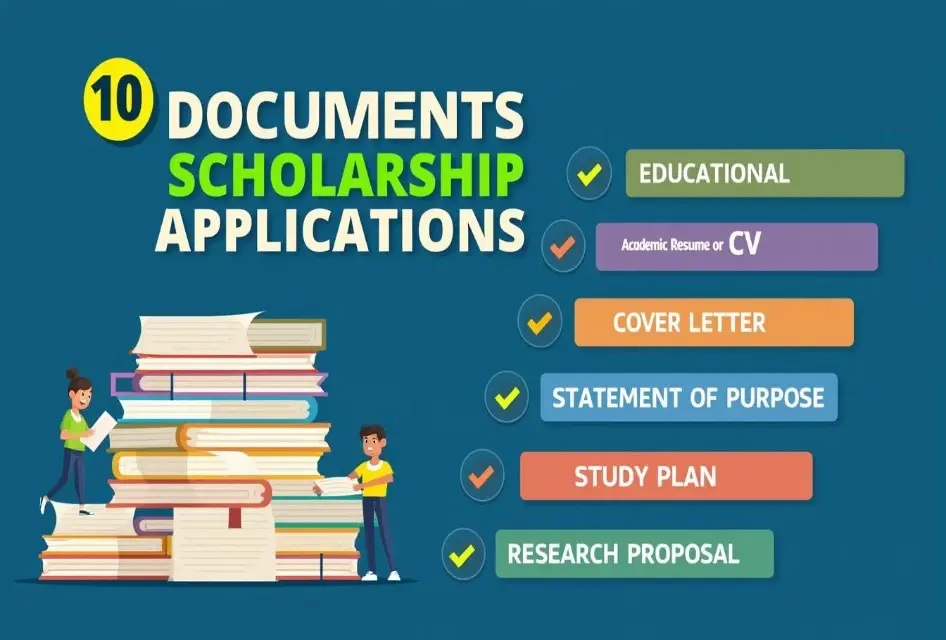
A Realistic Guide to Getting Scholarships and Studying Abroad with a Low GPA
Seeing a poor Grade Point Average (GPA) on your transcript can make you feel like your dream of studying abroad is over . here is how to get A Scholarship with a very low CGPA
You probably heard that only students with straight A's may get scholarships and get to the best colleges But this is a typical mistake.
This guide's experts and success stories show that a low GPA doesn't spell the end of your aspirations of studying abroad; it just means you need to take a different more strategic approach This guide brings together useful tips from students and consultants who have successfully dealt with this problem It shows you exactly how to get into school and get money even if your grades aren't great
Guide to Getting Scholarships and Studying Abroad with a Low GPA
Change Your Mindset: It's Not All About Grades
The first and most important thing you need to do is adjust how you think about the application process Most universities in the US and Canada use holistic admissions This means that they look at you as a full person not just your academics Your GPA is just one piece of information Ryan says "Don't apply for academic scholarships... that's all there is to it" But there are a million more scholarships for various things Your goal is to discover those chances and show that you are worth it in other ways
Things you can do to raise your GPA
Here are the tried-and-true methods that successful students like Joshua utilized to get a fully-funded Master's in Chemistry in the US even though he only got a "Pass" in his undergraduate degree
1. Choose the right universities and scholarships to apply for
Stop trying to win the very hard-to-get merit-based prizes Instead put your energy into things that you can actually do
- Look for niche scholarships: Find grants that are based on your
- Background: race ancestry and ethnicity
- Place: Your country state or city
- Career Goals: Wanting to be a teacher nurse architect etc
- Life Experience: Being in the military being a single parent or going back to school as an adult
- Financial Need: Many scholarships put showing financial need ahead of doing well in school
- "Think Small" for Bigger Wins: Instead of trying to get one big full-ride scholarship apply for a lot of smaller ones ($500 to $2,500) These are not as competitive and can lead to a lot of money
- Apply to colleges that have lower GPA cutoffs: A lot of colleges and universities say right on their websites that they will accept GPAs below 3.0 various of the schools shown in the movies are: California State University, Los Angeles(GPA 2.5+) Delaware State University(GPA 2.5+) Southern Illinois University(GPA 2.7+ for various programs) and the University of Arkansas at Little Rock(GPA 2.75+)
2. Make sure that every other part of your application is strong
Your GPA is a weak point so you need to make the remainder of your application as strong as possible
- Get relevant work experience: Employers really value professional experience A low GPA might readily be overshadowed by a stellar record in a related profession "They will be looking at your work history" says one specialist
- Get Strong Letters of Recommendation: Your recommenders are your advocates Pick lecturers or companies who can talk about your skills work ethic and potential with passion and who can clearly explain how your GPA doesn't show what you can do
- Write a strong Statement of Purpose (SOP): Your SOP is a tale about you Use it to honestly explain why your GPA is low (for example health problems or family obligations) without making excuses Then switch gears and talk about your abilities your love for the field and what you've done outside of school
- Make a strong CV or resume: Include:
- Research & Publications: Having even one publication like Joshua did is a huge plus
- Online Certifications: Take classes on sites like Courseraor edXthat are relevant to your field (for example Python data analysis or Microsoft Excel) to show that you are proactive and have up-to-date abilities
- Volunteer and Leadership Roles: Starting an NGO or heading a community project shows initiative leadership and real-world abilities that grades can't assess
3. Look at other academic paths
There are various ways to get into a Master's program if direct admission seems hard
- Conditional/Provisional Admission: Some schools like Colorado Christian Universitylet students in on a conditional basis You can only enroll if you keep a particular GPA in your first semester
- Get a Second Bachelor's or an Accelerated Program: Getting a second Bachelor's or an accelerated program (which combines a Bachelor's and a Master's) lets you build a new stronger academic record in the Western system
- Do Well on Standardized Tests: A high score on the GRE or GMAT can show that you have the intellectual ability to do graduate-level work which can make up for a low GPA
4. Take the initiative and keep going
Being passive is bad for you You need to be in charge of the process
- Get in touch with professors directly: Joshua got ahead by "sending cold emails to professors" Look for professors whose research is similar to what you want to study Talk about your situation your research experience and skills and ask if they have any funding options (Graduate Research Assistantships)
- Apply in Large Numbers: Treat applying for scholarships like a numbers game Ryan says that you should apply for "50 to 100 scholarships every week" The more you apply the better your chances of getting in
- Follow Up on Admissions: Don't merely accept an offer of admission if it doesn't come with money Joshua pushed for his funds by constantly talking to the graduate coordinator and lecturers until he got a Research Assistantship before his visa interview
How Assistantships Can Help You Understand Funding
Getting a Graduate Assistantship is one of the best ways to study in the US for less money This is a job at a university that usually pays for tuition and gives you a stipend
- Graduate Research Assistant (GRA): You help a professor with their research
- Graduate Teaching Assistant (GTA): You help teach undergraduate classes by grading papers and delivering tutorials
- Graduate Administrative Assistant (GAA): You work in a university office and do administrative tasks
These jobs are hard to get but they are often the main method that graduate students pay for their studies They want to see if you have the right skills and personality not just a high GPA
A Last Word of Support
You need to be tough work hard and be willing to put yourself out there on the road Joshua's experience shows that you need to be your own biggest supporter Your poor GPA is a problem but it's not a wall You may definitely make your desire of studying abroad come true by deliberately improving your overall profile going for the correct possibilities and clearly articulating your worth






